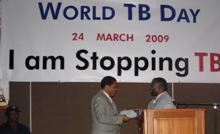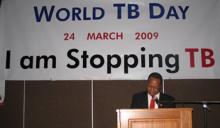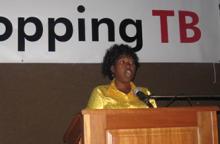The Deputy Prime Minister of the Kingdom of Swaziland Launches the STOP TB Partnership
Mbabane, 24 March 2009 -- Making an expression of commitment at the highest policy levels in the battle against TB in Kingdom of Swaziland, the Deputy Prime Minister, and Mr Themba Masuku launched the Swaziland Stop TB Partnership framework today. The timing was as apt as it was convenient-done on this very day where the world stops to take stock, reflect and raise awareness of the depredation caused by TB.
Although Swaziland is not listed among the 9 Southern High TB Burden countries, nor among the 9 African High TB Burden countries, the highest TB incidence in the world is reported in Swaziland at 1155 cases per 100,000 population. The STOP TB partnership that was launched here intends to engage active participation of NGOs, CBS FBOs, Development partners and government in reversing the current progression of TB in Swaziland.
The guest speaker at this occasion was the Deputy Prime Minister who lauded the efforts by all partners concerned in the battle against TB for their invaluable contributions. "Effective partnerships are keys in this struggle, as government alone cannot win the battle against TB.... Individuals cannot fight this battle alone and the Ministry of Health depends on the active involvement of our various stakeholders that are involved in the TB control in our country," he said. He lauded the non-governmental organizations, the private sectors, departments, and development partners for reviving their partnership against tuberculosis in Swaziland.
The Deputy Prime Minister Challenged all partners to assist the teams of nurses and community health workers as they strives to reduce, among other things, the TB treatment defaulter rates and thereby contributing to preventing the development of MDR and XDR-TB. He emphasized that "when all these are done, it is only then that we can look back with a sigh of relief and say that our efforts are indeed yielding some fruits"
Speaking during the same occasion, the World Health Organization Representative Dr Edward T. Maganu bemoaned the fact that the country's ability to identify cases as well as ensuring successful completion of treatment still "remains below the set targets". The case detection rate in Swaziland as recorded by WHO is about 60% out of a global target of 70% and the treatment success rate is 58% out of a global target of 85%. "This state of affairs calls on all of us as partners to work seriously to reach global targets in both these parameters," Dr Maganu he added.
Drawing from his voluminous experience in the battle against TB in Africa, Dr Maganu advised... "To me, having worked in TB for three decades, and having been involved in DOTS implementation for more than a decade, the DOT part of DOTS- the direct supervision by a health worker or a supervisor, of every dose taken by the patient, is the most critical factor that makes a TB programme work or fail. Our TB programme has to ensure that when it says DOTS is being implemented, this defining element of DOTS is in place. That is the only way we can prevent the spread of MDR and XDR", he stressed.
Concluding his remarks, the WHO Representative emphasized that "TB treatment outcomes can only be achieved through partnerships such as the one being launched today. Bringing together the public sector, civil society, NGO's, CBO's, FBO's etc, means that synergies will be exploited, and that the whole will be greater than the sum of its parts" he said.
One of the limelight of this occasion found expression in the compelling and moving testimony by Ms Albertina Nyatsi who, after having been diagnosed with TB also voluntarily tested for HIV and tested positive. "I am proud to stand here before you as living example that TB is curable even when you are living with HIV", she concluded her remarks.
The occasion was also attended by representatives from the different UN agencies, namely UNDP, UNAIDS, UNICEF and others.



